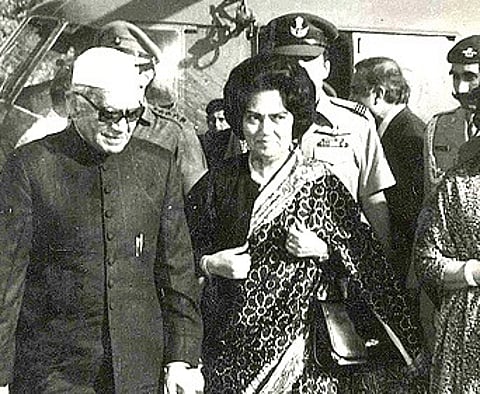

NEW DELHI:The Wikileaks cables on the Emergency gives a detailed picture of how the US dealt with India during those difficult years. On August 24, 1975, Indira Gandhi drove to Roosevelt house, the official residence of the US Ambassador, for dinner. In a cable sent on August 30, Saxbe noted that with Indira Gandhi in the lead, the government of India has made a number of favourable gestures towards the United States over the past month. “Officials tell us the word has come down to be responsive in dealing with the USA.”
“She interviews to ‘Meet the Press’ and ‘Saturday Review’ in attempts to reach what she knows is a critical audience. If her performances were inept, it was not for lack of effort or intention. Sanjay Gandhi’s lengthy interview describing his anti-Communist, pro-free enterprise views could possibly be seen as reinforcing this effort, although the haste with which the interview was modified and downplayed leaves us bemused,” the US cable said. Saxbe pointed out the US’ dilemma over the blow-hot blow-cold relationship between the two countries and further noted, “At times like this we see ourselves playing the Daisy game—she loves us; she loves us not. In this case we see the trend as favorable. The signals from the Government of India are more positive than negative, but we need not yet fear that the Prime Minister (Indira Gandhi) will hug us to death.”
Ambassador Saxbe noted that whatever steps Indira Gandhi took to repair Indo-US relationship were tentative and subject to instant reversal.
“If she is probing for a response, we are not sure what she is seeking. She will certainly be careful not to jeopardise her relations with the Soviets... We doubt the Prime Minister perceives substantial economic concessions to be gained from improved relations. She does not often think in such terms, but it may be her advisors have stressed the desirability of US investment and trade in selected areas,” he wrote in his cable. This suggests he did not think much of Indira’s economic instincts.
SENSELESS CENSORS
The cables reveal the US decided to go along with censorship guidelines on the Indian press by preventing US correspondents from using Embassy facilities and suspended all official briefings. Saxbe’s cable on June 27, a day after the Emergency was declared, says, “We are avoiding contacts with leaders of opposition parties and exercising caution in regard to our associations with Congress party members unfriendly to Mrs Gandhi.”
“We are restricting our briefing of the American press to deep back grounding on facts and avoiding analysis and predictions with absolutely no attribution or indication of American sources.”
“We do not intend to make embassy facilities available to American Correspondents in order to avoid Censorship,” the US cable said further adding that US government sponsored programmes were being rationalised to ensure they can successfully take place. We are similarly restricting travel by embassy Political and economic officers outside of New Delhi and the consular cities,” the cable added.
On July 2, 1975, Joseph J Sisco, Kissinger’s Chief Deputy Undersecretary of State for Political Affairs wrote a memo to his boss for approval which was later sent to the US embassy in New Delhi. Sisco said gratuitous US government criticism of Mrs Gandhi’s action might provide “psychic pleasure, but would obviously be deeply resented by her.”
PREZ’S CONCERNS
The US thought President Fakhruddin Ali Ahmed felt Indira and Sanjay Gandhi were pushing too hard on the political and constitutional system. A US cable dated August 6, 1976, said “Fakhruddin does seem to be uncomfortable with some of Mrs Gandhi’s actions and certainly with those of her son (we have heard much more reliably that Fakhruddin is seriously concerned over some of the government’s Family Planning moves).” The cable suggests that Indira had asked him to replace Vice-President Jatti for not praising the Emergency, which he refused.
A third version attributes a pique to a request by Sanjay Gandhi that he provide a statement for the opening issue of his new magazine Surya, a request the President allegedly turned down as inappropriate and unusual. Sanjay is said to have responded with unkind words and about the President, which were reported to him, led to his complaining to Mrs Gandhi and ultimately to the PM’s offer of an apology on behalf of her son.”
REVOLVING DOOR
A week before the Emergency was clamped, a US cable dated June, 16, 1975 quoted sources that West Bengal Chief Minister S S Ray may replace Mrs Gandhi as PM in case the Supreme Court turned down her stay request in the Allahabad High Court.
“Jagjivan Ram is arguing that while his support for Mrs Gandhi... is total, he would not feel bound to back her candidate if she resigned,” the cable added.
A cable dated August 26, 1975, said “Ray, D K Barooah and Rajni Patel... Mrs Gandhi has consulted or entrusted assignments to these three politicians since the Emergency... in the ‘Inner Circle’, each is in the ‘revolving door’ section. Mrs Gandhi has used them for their political advice, ideological balance or for fund raising”.
“According to a source privy to the working of the ‘Inner circle’, Ray has begun to see less of the Prime Minister. Barooah still sees her whenever he wishes, but she does not “let her hair down” with him.